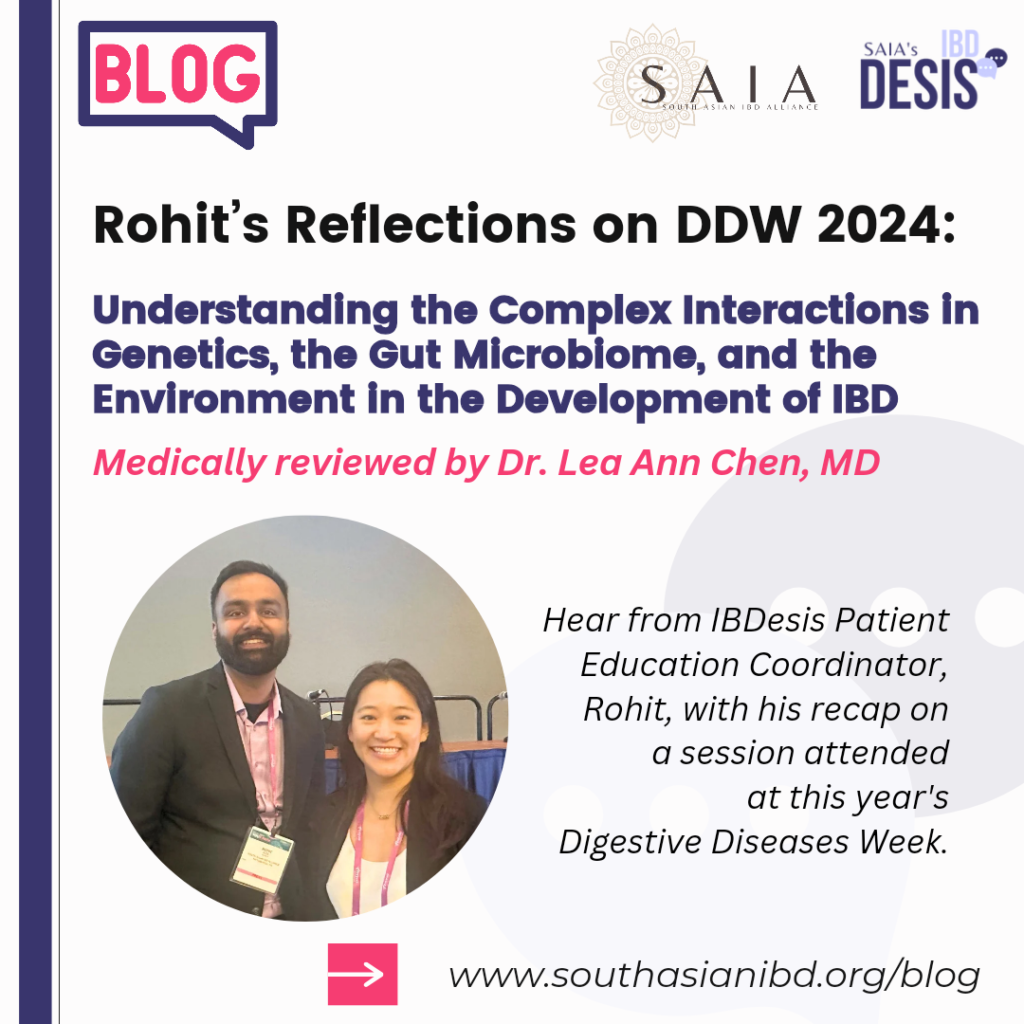
Written by: Rohit Aita
Reviewed by: Lea Ann Chen, MD
At Digestive Disease Week (DDW) in Washington, D.C., I had the privilege of being involved as co-author on an abstract and presentation given by Dr. Lea Ann Chen, Rutgers Robert Wood Johnson Medical School, titled Unaffected Relatives with High IBD Polygenic Risk Scores from Multiplex Crohn’s Disease Families Carry Microbiomes That Protect IL-10 Deficient Mice Against Intestinal Inflammation. As Dr. Lea Ann Chen’s former research assistant and Crohn’s patient advocate, I share patient-friendly insights into this important research.
This study focuses on families where multiple first-degree relatives (parent, child or sibling) have Crohn’s disease. The goal is to examine the complex relationship between genetic and environmental factors in the development of Crohn’s disease. I contributed to this study by applying polygenic risk scores (weighted scores based on the sum of all the genetic variants known to be associated with disease development) to our family datasets. This research was conducted in collaboration with Dr. Dermot McGovern’s laboratory at Cedars-Sinai Medical Center. I applied different versions of these polygenic risk scores to understand the contribution of genetic risk to Crohn’s disease development within these high-risk families. We then categorized family members by two factors: (1) whether they had Crohn’s disease and (2) whether they had high or low genetic risk for Crohn’s disease, based on their polygenic risk scores (PRS). We found several relatives who developed Crohn’s disease even though they had a low genetic risk for the disease, as well as relatives who were somehow protected from Crohn’s disease despite having a high genetic risk for the disease.
Based on disease status and genetic risk, the team transferred fecal material from family members into a mouse model of IBD. This model is deficient in IL-10, a small protein that regulates gut inflammation and is also involved in human IBD. However, IL-10 deficient mice only develop intestinal disease in the presence of gut bacteria, making them very helpful in research exploring the multiple factors that cause human IBD.
In our research, the goal was to see the impact that fecal samples from the different groups of family members would have upon the microbiome of the mice who were otherwise kept in a germ-free environment (so that any “germs” were coming from the fecal samples only).
We found low gut bacterial diversity in both relatives with Crohn’s disease and in the mice who received microbiomes from these relatives. Low diversity in the gut microbiome is typically associated with disease and poor intestinal health. We also found higher gut microbiome diversity in relatives who did not have Crohn’s disease and the corresponding mice who got their microbiomes. However, perhaps of most interest, we found that the diversity of gut microbiomes of Crohn’s disease patients also varied by their genetic risk, with high-risk individuals having the lowest microbiome diversity.
Interestingly, mice receiving fecal samples from relatives who did not develop Crohn’s despite high genetic risk had a higher diversity in their gut microbiome and lower intestinal inflammation.
Our findings suggested that relatives with high polygenic risk scores (indicating high genetic risk) yet do not develop Crohn’s may have a potential protective factor in their gut microbiome that shields them from intestinal inflammation. Our findings further suggest that there may be a link between the microbiome and the development of Crohn’s disease that can overcome a person’s underlying genetic risk for the disease.
So why does this research matter to me as a patient?
While the study of genetics has led to significant advances in the knowledge and treatment of Crohn’s, we still need to expand upon existing research to understand the microbiome of diverse patients with Crohn’s. This research, among many others within the academic community, highlights the importance of the microbiome in understanding how individuals may develop Crohn’s.This can help shed further light on the complex interplay between genetics and environmental factors that cause some individuals to develop Crohn’s and not others. This domain of research can also help us develop more targeted treatments in the future.
I was so grateful to be able to participate in these scientific discussions at DDW 2024. Watching Dr. Chen present this work was truly the icing on the cake. She is a big part of why I am in medical school today, and I hope to continue contributing to the research and treatment of Crohn’s disease.
